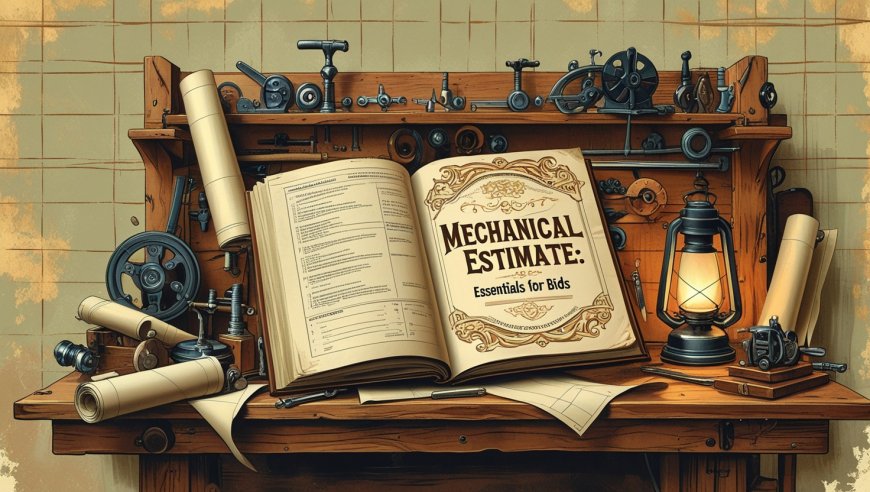Mechanical Estimate: Essentials for Bids
Learn the essentials of mechanical estimating for winning bids in 2025. Improve accuracy and avoid costly mistakes with expert estimating tips.

In today’s fast-paced construction environment, accurate estimating can make or break your bid. Mechanical systems—like HVAC, plumbing, and fire protection—are critical to any commercial or industrial project, and estimating them correctly is vital. That's why many contractors now rely on professional mechanical estimate services to gain a competitive edge.
Mechanical estimating for construction isn’t just about tallying equipment and labor. It’s about creating a smart, data-driven roadmap that helps you win more bids while staying profitable. Whether you’re a general contractor, MEP contractor, or project manager, having a strong grasp of mechanical estimates is no longer optional—it’s essential.
What Is Mechanical Estimating?
Mechanical estimating for construction involves calculating the costs of mechanical systems needed in a building project. This typically includes:
-
Heating, ventilation, and air conditioning (HVAC)
-
Plumbing and piping systems
-
Fire protection systems
-
Refrigeration and ductwork
These components must be accurately quantified and priced during the pre-construction phase to ensure proper budgeting, scheduling, and resource allocation.
Why Accurate Mechanical Estimates Matter
Bidding too high can cost you the job, while bidding too low can cost you your profit. Accurate mechanical estimates help you:
-
Prepare competitive, winning proposals
-
Avoid costly budget overruns
-
Ensure timely procurement and delivery
-
Optimize labor and material allocation
-
Align your construction schedule realistically
Mechanical systems are often among the most technically demanding and cost-intensive parts of a build, so a small miscalculation can have a big financial impact.
Key Components of a Mechanical Estimate
To build a reliable mechanical estimate, you’ll need to account for multiple layers of cost and complexity. Here’s what every estimator should include:
1. Material Costs
This includes pipes, fittings, ductwork, insulation, valves, HVAC units, chillers, and more. Be sure to use updated price lists, include taxes, and consider delivery charges.
2. Labor Costs
Labor must be calculated based on local wage rates, trade classifications, work hours, and installation difficulty. Union vs. non-union rates can also affect pricing.
3. Equipment and Tools
Factor in costs for machinery like lifts, cranes, or welding tools, and account for rental or maintenance expenses.
4. Subcontractor Pricing
If you plan to outsource any part of the mechanical work, get quotes from qualified subcontractors and compare scope and pricing carefully.
5. Overhead and Profit
Include your business overhead—like insurance, office expenses, and supervision—and decide on a fair profit margin based on project size and complexity.
6. Contingencies
Unexpected issues can arise, such as site changes or material delays. It’s smart to add a 5–10% contingency to cover unforeseen costs.
Tools That Make Estimating Easier
Gone are the days of manual calculations and spreadsheets. Today, many firms use estimating software designed for mechanical systems. These tools can:
-
Generate takeoffs from digital drawings
-
Use live pricing databases
-
Create organized reports and proposals
-
Speed up the estimating process
-
Improve accuracy and consistency
Some popular mechanical estimating tools include Trimble, FastEST, QuoteSoft, and PlanSwift. These platforms reduce human error and streamline the entire bid process.
Common Mistakes in Mechanical Estimating
Avoiding these mistakes can save time, money, and your reputation:
-
Using outdated pricing: Always verify material and labor costs with current rates.
-
Overlooking scope details: Double-check blueprints and specs to avoid missing key systems.
-
Ignoring local codes and standards: Compliance errors can lead to costly revisions.
-
Underestimating labor time: Factor in real-world conditions like weather, access issues, and site complexity.
Getting mechanical estimates wrong isn’t just about numbers—it’s about project risk. Accurate planning leads to smooth execution and client satisfaction.
Why Use Professional Mechanical Estimate Services?
Mechanical estimating requires a unique blend of technical expertise and market knowledge. If you lack the time or in-house skillset, outsourcing to experts is a smart move.
Professional mechanical estimate services offer:
-
In-depth knowledge of HVAC, plumbing, and fire systems
-
Access to real-time material and labor pricing
-
Speedy turnaround for bid deadlines
-
Detailed, itemized cost breakdowns
-
Support for change orders and project revisions
This can free up your team to focus on project management, client communication, and construction execution.
Mechanical Estimating in Design-Build Projects
In design-build projects, estimators work early in the planning phase. This requires estimating based on preliminary designs or concepts. It’s essential to:
-
Collaborate closely with engineers and architects
-
Make educated assumptions with clear documentation
-
Update estimates as designs evolve
-
Keep owners informed on cost implications
This proactive approach ensures design decisions remain aligned with the budget and schedule from day one.
Bidding Strategy and Estimate Presentation
Your mechanical estimate isn’t just an internal document—it’s a powerful sales tool. When submitting a bid, your estimate should:
-
Be well-organized and easy to understand
-
Clearly outline inclusions and exclusions
-
Match the client’s requested format
-
Highlight your value and expertise
A polished estimate builds trust and shows that your firm is professional, reliable, and ready to deliver.
Final Thoughts
Winning mechanical bids in today’s construction landscape demands more than quick math. It takes precision, preparation, and the right tools. By understanding the essentials of mechanical estimating for construction, you can deliver accurate, competitive proposals that win work and keep projects profitable.
Whether you do it in-house or rely on trusted mechanical estimate services, investing in better estimating is one of the smartest moves you can make. In a market where margins are tight and timelines are shorter, the contractors who estimate right are the ones who come out ahead.



































































